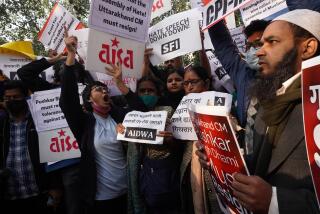Rumors of child-kidnapping gangs and other WhatsApp hoaxes are getting people killed in India

- Share via
Reporting from Mumbai, India — Police officers in a district of southern India had an unusual assignment. They traveled from village to village early this month to tell people that some messages that had gone viral on the WhatsApp service were fake.
The messages claimed that a gang from northern India had arrived to kidnap children. One showed two photographs of a man being taken away by police with the text: “Please take care of your children. Don’t send them alone.”
S.P. Pakalavan, police superintendent in the Vellore district of Tamil Nadu state, ordered officers at the 57 stations under his jurisdiction to dispel the rumor. Traveling by motorbike and auto rickshaw, some with speakers mounted on top, they covered nearly 700 villages over four days, Pakalavan said.
“That was the only way to pacify the panic-stricken residents,” he said.
Other parts of Tamil Nadu were not so fortunate. Two people were killed in the state on May 9 by mobs that believed they were child traffickers. A man was beaten and hanged from a bridge, and separately a 63-year-old woman was lynched when she and her relatives, while traveling to a temple, reportedly stopped to hand candies to children.
Police say there was no truth to the rumors and that WhatsApp has become a vehicle for mayhem and fake news in India, its biggest market with 200 million active users. Law enforcement officials say they are struggling to combat the spread of false information on the popular platform, especially messages that preach communal hatred or encourage violence.
Shirish Inamdar, a former deputy police commissioner in the western state of Maharashtra, said in an interview that the messaging service has become “a monster” as uneducated users lack the awareness to verify rumors and educated users use the platform to spread hate.
Officials with the Menlo Park-based company, which is owned by Facebook, say that policing false information is challenging because unlike Facebook, WhatsApp messages are private and encrypted and the company does not read content unless a user reports it for being offensive. The company says it is trying to educate users to be more vigilant about potentially harmful messages.
“WhatsApp has made communications easier and more reliable for millions of Indians, including community organizations and local police. Though sadly, some people also use WhatsApp to spread harmful misinformation,” the company said in a statement to The Times.
“We’re stepping up our education efforts so that people know about our safety features and how to spot fake news and hoaxes.”
According to police, at least five people were killed in southern India over the past two weeks in connection with rumors on WhatsApp of child kidnapping gangs, including some that “smash skulls and devour brains.” Another 10 people were beaten in related cases, police said.
In Karnataka state, the messages involved violence, including videos of mobs dragging a bloodied man through the street and roughing up two unidentified men before handing them over to police.
An accompanying message claimed that 400 child traffickers had arrived in Bangalore, the state capital, and said in English: “Be on high alert. 3 kids were kidnapped from my friend’s area this morning. There were 10 guys giving biscuits and people from that area have caught all 10, and five more based on their information.”
Another message accused transgender people of being involved in child trafficking. Over the weekend, in the southern city of Hyderabad, a mob attacked a group of transgender women, killing one and seriously injuring two.
When police arrived, onlookers reportedly attacked their vehicle, accusing them of protecting kidnappers. Some officers were injured. More than 20 suspected attackers were arrested, and police said they were placing members of the transgender community, homeless people and others at risk of beatings into shelters, or asking them to leave the city temporarily.
Hyderabad police launched a campaign to urge people not to believe the social media content “which is creating unnecessary panic.”
They were not the first instances of violence related to WhatsApp messages, authorities said. In May 2017 in the northern state of Jharkhand, police said seven innocent men were killed after messages spread about a kidnapping gang from other parts of India. Two men were arrested in the killings.
In September 2015, Hindu extremists in the northern state of Uttar Pradesh spread word that a Muslim man had killed a cow — which is sacred to orthodox Hindus — and kept it in his refrigerator. A mob subsequently barged into his house and lynched him. Police filed charges in the killing against nearly 20 people, most of whom are out on bail.
Indian political parties have used WhatsApp to rally followers, and radical groups are using it to promote communal hatred in a country increasingly divided between majority Hindus and members of minority communities, including Muslims.
In a recent state election in Karnataka, party workers were among those blamed for circulating fake polls, hoaxes about the killings of Hindu activists and false claims that a Muslim lawmaker had promised “unending bloodshed of Hindus” if voted into power.
Amid the growing outcry, and with national elections due next year, WhatsApp said this month that it had instituted new features for its group messaging option — one of the most common ways that hoaxes spread rapidly — giving administrators greater control over membership in the group. The company is also expected to introduce a feature that will make it more obvious when a new message has been forwarded by another user, in a bid to encourage the reader to think twice about its content.
But some say that Indians will remain vulnerable to false messages that confirm their prejudices.
“In a society increasingly polarized along caste and religious lines, it becomes easier to exploit that through WhatsApp [messages],” said Inamdar, the former police official.
“The ones [often] sharing communal propaganda on WhatsApp are educated people, the middle class, which we used to call the backbone of our society,” he said. “That is most worrying. Our law-and-order machinery, along with cybersecurity bodies, have failed miserably to judge this danger.”
Twitter: @SBengali
Parth M.N. is a special correspondent.
ALSO
Muslims faced hatred and violence in Sri Lanka. Then Facebook came along and made things worse
Fake news fuels nationalism and Islamophobia — sound familiar? In this case, it’s in India
Asia’s newest drug war leaves more than 90 people dead in less than two weeks
More to Read
Sign up for Essential California
The most important California stories and recommendations in your inbox every morning.
You may occasionally receive promotional content from the Los Angeles Times.











